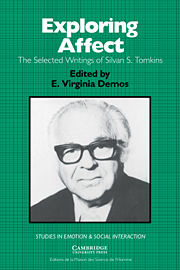Book contents
- Frontmatter
- Contents
- Foreword
- Editor's preface
- List of contributors
- Chronology
- Introduction
- Part I Affect theory
- Introduction
- Selections by Silvan S. Tomkins
- Part II Affect and ideology
- Introduction
- Selections by Silvan S. Tomkins
- Part III The face of affect
- Introduction
- Selections by Silvan S. Tomkins
- Part IV Script theory: The differential magnification of affect
- Introduction
- Selections by Silvan S. Tomkins
- The rise, fall, and resurrection of the study of personality
- Script theory
- Revisions in script theory – 1990
- The varieties of shame and its magnification
- Part V Human being theory: A foundation for the study of personality
- Introduction
- Selections by Silvan S. Tomkins
- A complete annotated bibliography of Silvan S. Tomkins's writings
- References
- Author index
- Subject index
- Titles in the series
Script theory
Published online by Cambridge University Press: 10 November 2010
- Frontmatter
- Contents
- Foreword
- Editor's preface
- List of contributors
- Chronology
- Introduction
- Part I Affect theory
- Introduction
- Selections by Silvan S. Tomkins
- Part II Affect and ideology
- Introduction
- Selections by Silvan S. Tomkins
- Part III The face of affect
- Introduction
- Selections by Silvan S. Tomkins
- Part IV Script theory: The differential magnification of affect
- Introduction
- Selections by Silvan S. Tomkins
- The rise, fall, and resurrection of the study of personality
- Script theory
- Revisions in script theory – 1990
- The varieties of shame and its magnification
- Part V Human being theory: A foundation for the study of personality
- Introduction
- Selections by Silvan S. Tomkins
- A complete annotated bibliography of Silvan S. Tomkins's writings
- References
- Author index
- Subject index
- Titles in the series
Summary
If personology is to fulfill the aspirations of Murray's Explorations in Personality, it must match the depth and scope of that pioneering vision. It must ground personality in an evolutionary biological base that provides the foundations for a model of the human being at a general psychological level, which is in turn embedded in a historical, sociocultural, and civilizational matrix. The human being is born a biological entity, whose destiny it is to die a socialized, acculturated advocate or adversary of a civilization at a particular historical moment. If personology is to become a science for all seasons it must assume the daunting burden of analyzing and resynthesizing the particular and the abstract, the historic and the ahistoric, the micro components and the macro fields and contexts, origins and terminals, continuities and discontinuities, rapid changes and slow changes, stable equilibria and unstable equilibria. We must study personality not only the long way developmentally, but also the deep way biologically and the broad way historically (Tomkins, 1979, 1981a, b). I offer script theory as a first approximation in such a quest.
Overview of script theory
Script theory, as a theory of personality, is built upon a particular theory of the innately endowed nature of the human being (Tomkins, 1962, 1963, 1963b, 1979). Script theory assumes that the basic unit of analysis for understanding persons, as distinguished from human beings, is the scene and the relationships between scenes, as ordered by sets of rules I have defined as scripts.
- Type
- Chapter
- Information
- Exploring AffectThe Selected Writings of Silvan S Tomkins, pp. 312 - 388Publisher: Cambridge University PressPrint publication year: 1995
- 14
- Cited by



